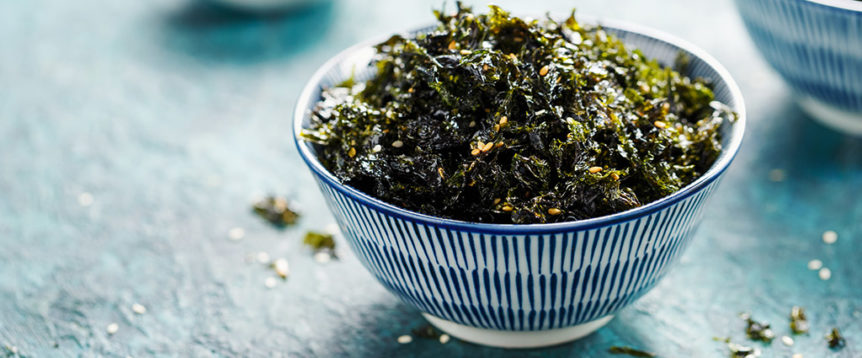To expand your superfood repertoire, turn your sights to the ocean, where sea vegetables are waiting to supply nutrients and flavor to meals and snacks. And by sea vegetables we mean seaweed—but don’t let the name fool you. Green, brown and red macroalgae are anything but weeds; they are nutritious vegetables that have been nourishing seaside populations for centuries. Thanks to trends in Asian cuisines, sustainability and nutrient-dense foods, more seaweeds are available in exciting formats.
Common edible seaweeds include wakame, kelp (called kombu in Japan), dulse and nori. They are high in protein and nutrients, including vitamins A, C, D, E and K. Calcium, magnesium, potassium, copper and iodine minerals are also plentiful, as are omega-3 fatty acids. The soluble fiber found in seaweed increases satiety and lowers LDL cholesterol. Other appealing factors are its sustainability and its great umami flavor.
The most familiar seaweed is nori, the pressed seaweed sheet that wraps sushi and serves as a crispy snack from brands like gimMe. Its briny taste adds punch to Japanese rice-cracker snack mixes and to novel products like Annie Chun’s Baked Seaweed Crisps, a puffed-rice chip fused to a nori sheet.
Furikake, a Japanese dry seasoning, features bits of savory nori blended with sesame seeds and dried fish to flavor rice, vegetables, salads and soups. Blue Evolution takes this concept to Italian cuisine with its Classic Marinara Seasoning blend that includes seaweed and spices cooked with tomatoes and olive oil for a super-umami pasta sauce. The company also blends seaweed with wheat to make fortified and lower-carbohydrate pasta in rotini and penne shapes, a smart way to add iron and other nutrients to a favorite meal.
Kelp or kombu is another common seaweed. It’s the base of the simple Japanese broth dashi. Although it’s easy to steep dried kombu in hot water, it’s even easier to turn to the Ocean’s Halo line of packaged seaweed broths, made from organic kelp. Ramen, miso, pho, veggie and Thai coconut broths cover the bases for popular Asian-style soups. Ocean’s Halo also makes superfood kelp beverages, enhanced with electrolyte- rich deep-ocean water in flavors of Passion Guava, Kiwi Aloe and Strawberry Coconut. Another surprise turn for kelp is in salsas and pickles from Barnacle Foods, a small company on a mission to use wild-harvested Alaskan kelp to bring sustainable and good-tasting sea vegetables to more tables.
Other places to find healthful sea vegetables are at grocery sushi counters, where green threads of wakame are turned into sesame-seed-garnished salads. In the future, watch for dried Irish or Scottish dulse that can be revived to serve as pasta noodles, similar to zucchini zoodles. No matter the variety, sea vegetables are an all-around super food idea.

